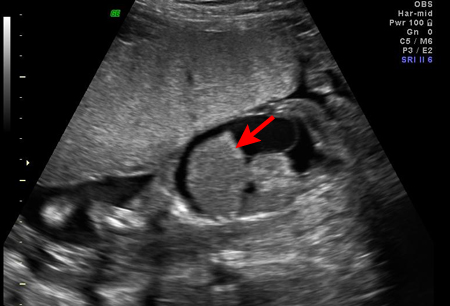Resumen
Definición
History and exam
Key diagnostic factors
- presença de fatores de risco
Risk factors
- história de feto RhD-positivo em mãe RhD negativa
- hemorragia feto-materna
- procedimentos fetais invasivos
- trauma placentário
- aborto
- multiparidade
- omissão da imunoprofilaxia de Rh
- versão cefálica externa
- gravidez molar
- gravidez ectópica
Diagnostic tests
1st tests to order
- tipo sanguíneo materno
- exame de anticorpos Rh no soro materno
Tests to consider
- título de anticorpos séricos materno
- tipo sanguíneo paterno
- zigosidade paterna
- ultrassonografia fetal
- velocimetria Doppler da artéria cerebral média do feto (pico de velocidade sistólica)
- tipagem sanguínea do feto (decorrente de amniocentese ou circulação materna)
- avaliação direta de anemia fetal
- teste de roseta
- teste de Kleihauer-Betke/citometria de fluxo
Treatment algorithm
mãe RhD-negativa não sensibilizada
mãe RhD-negativa sensibilizada
neonato com eritroblastose
Contributors
Autores
Andrew D. Hull, MD, FRCOG, FACOG
Professor of Clinical Obstetrics, Gynecology, and Reproductive Sciences
Director, UC San Diego Maternal-Fetal Care and Genetics
Division of Maternal-Fetal Medicine
Department of Obstetrics, Gynecology, and Reproductive Sciences
University of California San Diego
La Jolla
CA
Declarações
ADH declares that he has no competing interests.
Agradecimentos
Dr Andrew D. Hull would like to gratefully acknowledge Dr Karen Fung-Kee-Fung and Dr Felipe Moretti, previous contributors to this topic.
Declarações
KFKF is an author of a reference cited in this topic. KFKF and FM declare that they have no competing interests.
Revisores
Alan Cameron, MD
Honorary Professor of Medicine
University of Glasgow
Glasgow
UK
Declarações
AC is an author of several references cited in this topic.
Liakat Ali Parapia, MD, FRCP
Consultant Hematologist
Bradford Teaching Hospitals NHS Trust
Yorkshire Clinic
Bingley
Bradford
UK
Declarações
LAP declares that he has no competing interests.
Kenneth J. Moise, Jr., MD
Professor of Obstetrics and Gynecology
Texas Children's Fetal Center
Baylor College of Medicine/Texas Children's Hospital
Houston
TX
Declarações
KJM declares that he has no competing interests.
Créditos aos pareceristas
Os tópicos do BMJ Best Practice são constantemente atualizados, seguindo os desenvolvimentos das evidências e das diretrizes. Os pareceristas aqui listados revisaram o conteúdo pelo menos uma vez durante a história do tópico.
Declarações
As afiliações e declarações dos pareceristas referem--se ao momento da revisão.
Referências
Principais artigos
Brennand J, Cameron A. Fetal anaemia: diagnosis and management. Best Pract Res Clin Obstet Gynaecol. 2008 Feb;22(1):15-29. Resumo
American College of Obstetrics and Gynecology. ACOG practice bulletin no. 181: prevention of Rh D alloimmunization. Obstet Gynecol. 2017 Aug;130(2):e57-70. Resumo
American Congress of Obstetrics and Gynecology. ACOG practice bulletin no. 192: management of alloimmunization during pregnancy. Obstet Gynecol. 2018 Mar;131(3):e82-90. Resumo
Qureshi H, Massey E, Kirwan D, et al. BCSH guideline for the use of anti-D immunoglobulin for the prevention of haemolytic disease of the fetus and newborn. Transfus Med. 2014 Feb;24(1):8-20.Texto completo Resumo
Visser GHA, Thommesen T, Di Renzo GC, et al. FIGO/ICM guidelines for preventing Rhesus disease: a call to action. Int J Gynaecol Obstet. 2021 Feb;152(2):144-7.Texto completo Resumo
Artigos de referência
Uma lista completa das fontes referenciadas neste tópico está disponível para os usuários com acesso total ao BMJ Best Practice.

Diagnósticos diferenciais
- Hidropisia fetal não imune
- Infecção por parvovírus
- Doença hemolítica não relacionada ao RhD
Mais Diagnósticos diferenciaisDiretrizes
- ACOG clinical practice update: paternal and fetal genotyping in the management of alloimmunization in pregnancy
- ACOG clinical practice update: Rh D immune globulin administration after abortion of pregnancy loss at less than 12 weeks of gestation
Mais DiretrizesConectar-se ou assinar para acessar todo o BMJ Best Practice
O uso deste conteúdo está sujeito ao nosso aviso legal